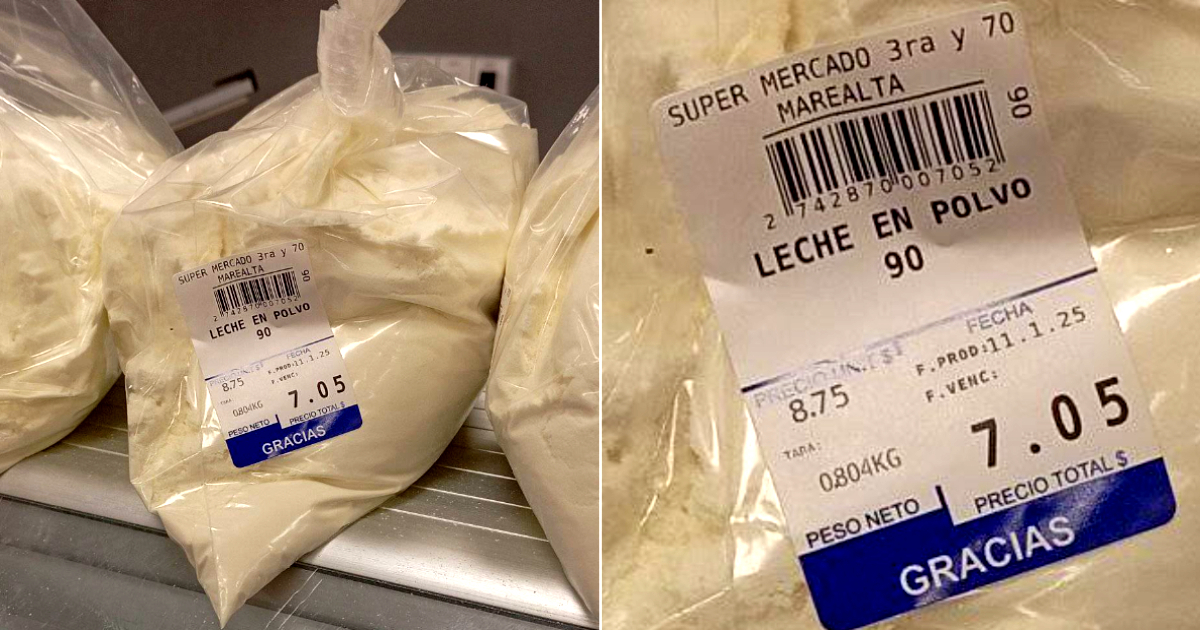
Related videos:
The emergence of powdered milk in dollar stores in Havana has sparked intense controversy on social media and in the daily lives of Cubans, highlighting the repercussions of the dollarization of the economy on the island.
The incident took place at the controversial store on 3rd and 70, recently opened in Miramar, where customers reported the availability of the product, although at elevated prices and under questionable circumstances, such as the dubious repackaging of the item.
The context of dollarization and the "reappearance" of products
In recent years, the Cuban government increased sales in freely convertible currency (MLC) as a strategy to attract foreign currency amid a deep economic crisis.
But the recent approval of the "partial dollarization of the economy" (to "de-dollarize it," according to Prime Minister Manuel Marrero Cruz) has resulted in essential products, such as powdered milk, being available exclusively in dollarized stores, while they remain absent from the market in Cuban pesos, and even in those that accept MLC.
This phenomenon is not new. In 2022, the regime announced that the national production of powdered milk would be primarily allocated to MLC stores, citing the need to fund imports.
However, this strategy exacerbated inequalities and left a large portion of the population without access to basic products due to a lack of dollars. Aware of its impact on public opinion, the regime tries to hide by all means the existence of stores that sell powdered milk in foreign currency.
Consumer testimonials and complaints on social media
The reappearance of powdered milk at 3rd and 70th was met with a mix of surprise and indignation.
Social media users pointed out that while children in many households are consuming alternatives like syrup, dollar stores offer repackaged milk at prohibitive prices.
On her part, another user shared on Facebook her experience at the aforementioned supermarket, confirming the sale of powdered milk in dollars.
"We bought four bottles of water and were charged more than the price displayed on the shelves. The bag of powdered milk advertised at $7.75 was charged at $8.75. It's very sad that a market where Cubans have to work magic to gather dollars has turned into a place where you are robbed in plain sight," he recounted.
The political and economic background
The sale of powdered milk in dollars is not just an economic issue, but also a political one. Analysts like Emilio Morales have pointed out that dollarization mainly benefits the military conglomerate GAESA, which controls the stores in MLC and over 70% of the dollarized economy in the country.
This structure aims to centralize foreign currency revenues, which, according to Morales, deepens the systemic crisis and increases popular discontent.
In December 2024, the government announced that children would receive powdered milk as part of the basic food basket, but the quantities were insufficient to meet the demand, so they opted to offer a "preparation", just as on previous occasions the solution has been provided by "syrups".
At the same time, basic items like soft drinks and juices reappeared in dollar stores, which sparked criticism on social media regarding the prioritization of the foreign exchange market over the needs of the population in pesos.
Mixed opinions
While the ousted Minister of Economy and Planning, Alejandro Gil Fernández, stated in 2022 that dollarization would ensure the sustainability of certain basic products, many believed that this strategy would further marginalize Cubans without access to dollars.
However, high prices and irregularities in dollarized stores have undermined the narrative of the former minister who vanished from the scene, as well as the success expectations of those who ousted him.
For many, dollarization represents the loss of access to basic rights. As a user expressed on social media: "Even the 'Piñata' soda has reappeared, but in dollars. What about those who don't have access to this currency?"
The reappearance of powdered milk in dollarized supermarkets is a reflection of the complex and unfair reality that Cuba faces under a "continuity" regime that aims to meet the basic needs of its population by selling essential products in a currency with which it does not pay salaries, pensions, or checks.
Filed under: